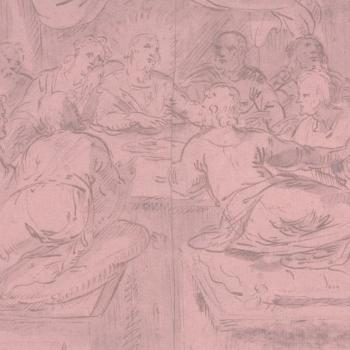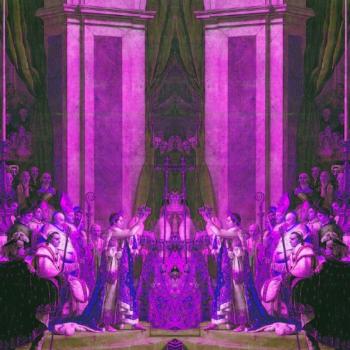 Who created God? It isn’t a bad question to ask. Although it isn’t often queried about. While it is a valid question, it is a scary one. You know what they say…curiosity killed the cat! There is this sense that if we keep to ourselves and don’t go too dangerously far down the rabbit hole we will be ok. Perhaps the question is perceived as an irreverent one. Maybe we are afraid what it might mean that our minds have even reached a point where we suppose there might be an answer to this question. It is all a bit complicated, isn’t?
Who created God? It isn’t a bad question to ask. Although it isn’t often queried about. While it is a valid question, it is a scary one. You know what they say…curiosity killed the cat! There is this sense that if we keep to ourselves and don’t go too dangerously far down the rabbit hole we will be ok. Perhaps the question is perceived as an irreverent one. Maybe we are afraid what it might mean that our minds have even reached a point where we suppose there might be an answer to this question. It is all a bit complicated, isn’t?
Earlier this year Hebrew and ancient religion scholar Francesca Stavrakopoulou published “God: An Anatomy.” While I have three seminary degrees I am no expert on the Hebrew Scriptures or history. When I teach or preach out of the Hebrew Testament I tread very carefully, as it was and is Jewish Scripture before it was my own and claimed by Christianity as the Old Testament. So when I saw this book was being published as such a large volume by a well respected scholar and thinker I was really looking forward to getting my hands on it. I must say, it did not disappoint. Like most books I devour and can’t book down, my copy is thoroughly marked up and it has been a text I have returned to many times since.
When I handle and study Biblical texts, I don’t usually concern myself too much with empirical realities outside of it. Of course, I am interested in the world in which these texts were birthed and certainly reflect, but when it comes to interpretation the text usually can tell us all we need to know.
We have the god of the Bible and we interpret this god as such…within the bounds of its home, i.e. the biblical text and its narratives(s). That is the only way it makes sense, and we can then interpret and derive meaning.
However, if you are interested in the birth of the “God of the Bible,” Yahweh’s evolution and ancient near Eastern historical realities, and the ultimate question, “who created God?” we certainly have to go elsewhere. The Bible is not a history book, it is a deeply meaningful and spectacular religious narrative of a people and their own telling of their history with their god. And this is a beautiful thing.
When I was in my first round of seminary in my early 20’s I learned so much. There was also a lot I didn’t learn. I can see that now. But at the time, fresh out of a Pentecostal Bible College, I soaked up all that was new and different. It was so exciting! So much of the puzzle was coming together for me. And it didn’t take away from the god I served at the time, it added to it. I’m so thankful, still, for those days.
I remember sitting in an Old Testament class on Wisdom Literature. This professor was seen as particularly liberal compared to some of the more conservative Evangelical professors. I remember sitting in his class one week and he started talking about Ba’al worship, the ancient Canaanite god of thunder and storm and son of El the great god and head of the Pantheon.
Most of you might have heard the name Ba’al or Ba-El before. It comes up over 90 times in the Hebrew Scriptures. Particularly, we can see that there are actual Psalms that talk specifically about the god of thunder and lightning, which would have been a direct reference to Ba’al. We also know from ancient Ugaritic texts and tablets that there are striking similarities in rhetoric. It stands to reason that the writer of the Psalms and Proverbs would have been familiar with the worship of their Canaanite ancestors and could have likely re-authored it in worship and in service to Yahweh. This is how my professor talked about it. And he wasn’t wrong.
I was so delightfully disturbed. To be frank, I was elated! This awakened and aroused within me so much desire to know more. Because, at the time I thought to myself, now I can engage in conversations with those who tried to debunk the authority of the Bible! And I encountered so many at that time in my life. The arguments were always the same…
“Did you know texts from Mark were taken from Homer’s odyssey?”
“Or what about that this worship to Yahweh was actually for El and Ba’al and other gods?”
And now I could say (and did!) “Yes, I do. And here’s how that happened and here’s why it happened. The writers decided to give worship where true worship was due. And as a way to subvert other gods this is what they did.”
It was empowering and I loved it. I wasn’t threatened by anyone’s Atheist argument. Even now, I find these arguments boring and tired and still a complete non-starter.
In any case, my professor didn’t take this all the way. He stopped a bit short of what most would have seen as heresy and that is the fact that this worship was actually for Ba’al. Not his fault. I think the administration would have ate him for breakfast if he had done so. There are lots of historical arguments and evidence that: 1. The Yahweh cult morphed from narratives and myths about El, 2. That Yahweh was actually Ba’al, 3. That there was still an active pantheon and worship of this pantheon at the time Yahweh worship started to emerge.
Unfortunately, it wasn’t a safe enough space for him to say a lot of that.
But Francesca Stavrakopoulou does…and more.
One thing we must always remember, that I feel like I say often, is that we always make god in our own images. Which makes sense. Why wouldn’t we? Why wouldn’t we worship a god that relates, knows how we tick, and understands us?
In ancient times deities behaved like humans. This was a bit problematic when it came to the moral nature that gods would often take on, but this is how the gods related to humans and humans related to gods.
Back in the day, in what was known at Levant or Levantine (which is modern day Lebanon, Syria, Iraq, Palestine/Israel and Jordan), there was an extremely active Pantheon. El was the head, having 70 sons, one of which was Ba’al…and…one of which was (may have been) Yahweh. Yahweh, the son of El, the son of God. Historical documents (what we have) can corroborate this.
Historical documents are frustratingly silent when it comes to Yahweh worship emergence. Although we see Yahweh break onto the scene around late 2nd and early 1st millennium BCE.
It isn’t difficult to figure out that Israel, as a tiny nation that was forming, wanted to rise to the top. Yahweh eventually came to be known as a god of storm and war. Not as big and as bad (or as well known) as Ba’al ,but he did just the same. They wanted this sort of god to be their personal patron and give them a bit of street cred. Yahweh was actually a minor deity, but still a ferocious storm deity.
Stavrakopoulou says that he was “at the margins of the inhabited world” and this was within the “dangerous, mountainous wilderness.” Although Yahweh wasn’t alone as a “desert dwelling deity.”[1]
He was part of the Shadday gods, the gods that lived in the wilderness. Which also makes sense for Israel’s story. We also know that these desert deities were in subject to El, as we have record of El as El-Shadday. This is El, head of the ancient Levantine Pantheon. The El, that according to Stavrakopoulou, is the one who is recognized by Abraham, Isaac and Jacob. It was the El of Isra-el or Yisra-el, the El of El Shaddai.
How Yahweh usurped El is “frustratingly unclear.”[2] But, again, looking at the socio-political situation of the emergence of Israel and Judah, it is easy to see why they may have claimed personal patronage of Yahweh to enhance and legitimate their royal powers and kingdoms.
By the 9th century Yahweh is “firmly established as the head of the local pantheons of two kingdoms.”[3] As we arrive to the writings of the prophets in exile we can see the case they are making. It isn’t Yahweh’s fault. He hasn’t abandoned us. We are still worshipping the other gods and we need to stop and worship Yahweh exclusively. Then he will help us.
And thus, we have the new image of the “god of the Bible”.
Myths snowball. Because gods reflect cultures, situations, needs and those they serve. And that changes with every new generation.
Maybe you are reading this and your mind is slightly blown. Or maybe you see me as an atheist heretic. Or perhaps you are offended by my irreverent study of god outside of the Scriptures. In any case, hang with me for a minute because this story continues to be written and I am just as excited about it as I was in my early days of seminary as my professor took me on a journey I have sojourned again and again.
What does the birth of god have to do with the birth of Jesus? And does Jesus even matter if this is god’s origin story? The god of the bible anyway.
We are Christians because Jesus continues the beautiful trajectory of the story.
Jesus is a completely new interpretation of god-a brand new son of god. One that would subvert not only the Roman Imperial cult, but the Yahweh cult, as well.
Our “god of the Bible” is the son of God (El), made in the image and needs of his people. Our Jesus-Son of god-is the redesign. A brand-new launch!
The savior of the world and perhaps the savior of the image of god.
Maybe this was his attempt.
Maybe it might be our attempt, as well.
With a grateful mind and heart, I dedicate this post to a beloved Hebrew Bible teacher and scholar Tim Sena.
[1] Francesca Stavrakopoulou, God: An Anatomy. (London: Picador, 2021), 21.
[2] Ibid, 22.
[3] Ibid, 23.













